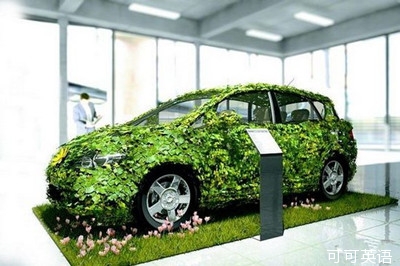(单词翻译:单击)
As Tesla prepares to begin selling its Model S in smog-ridden China, the question is:
随着特斯拉公司准备开始在雾霾笼罩的中国大陆销售它的S型电驱动车,问题也随即出现了:
do electric cars reduce air pollution?
电动汽车真能减少空气污染吗?
And the answer is: it depends.
而答案是看情况而定。
That on-the-one-hand-yes-but-on-the-other hand-no conclusion comes from a study predicting the impacts of electric cars in the U.S. to 2050.
这种模棱两可的答案来自于一项研究,它研究的是预测美国电动汽车在2050年时的影响力情况。
It's in the journal Environmental Science and Technology.
这项研究已在《环境科学与技术》杂志上发表。

The reason it depends is that we don't know the future.
结果看情况而定这种答案出现的原因就是我们不知道未来会如何。
Will batteries be cheap?
电池会降价?
Will the U.S. have a law limiting carbon dioxide?
美国会出台限制二氧化碳排放的法律?
Which will cost less: oil or natural gas?
汽油和天然气哪个更便宜呢?
Depending on the answers, electric vehicles and hybrids might not reduce air pollution at all.
上述问题的答案是关键,电动车和混合动力车也许根本就不能对减少空气污染起到重要作用。
They could even make it worse.
它们也许会使事情变得更糟呢。
Researchers ran 108 different computer models of how driving might change in the next few decades.
研究人员们运行了108种不同的计算模式来分析是否开车这项人类活动会在接下来几十年发生变化。
And it turns out the key to reducing air pollution isn't how many electric cars there are.
然而减少空气污染的这个重任并不与投放了多少电动车有重要联系。
What matters is whether there are regulations in place to mandate reductions in CO2 and other pollutants.
关键的问题其实是,是否有明确合适的法律法案强制力保证实施减少二氧化碳以及其它污染物的排放量。
As it stands, battery cars that run on electricity from burning coal can be more polluting than cars that get good mileage on gas.
正如看到的那样,电动车从烧煤变为用电驱动,可是会比燃气行驶很多公里数的车造成的污染更多。
And that's why a Tesla in China, where most electricity comes from coal, is no zero-emissions vehicle.
所以这就是为什么中国的特斯拉电动车根本不是所谓的零污染排放,因为中国大部分地区还是用煤炭作为燃料。


